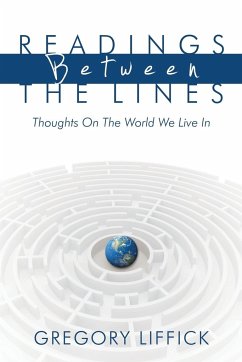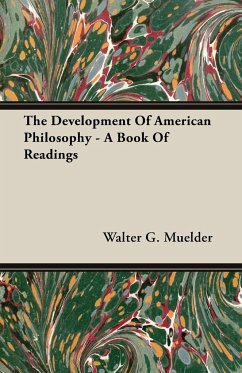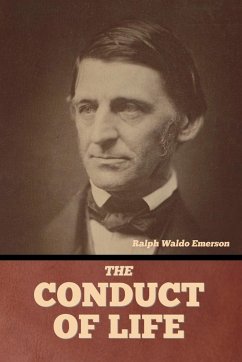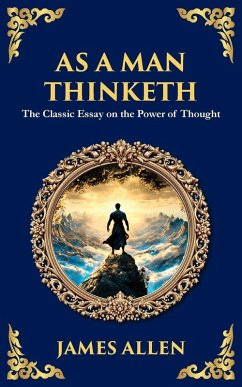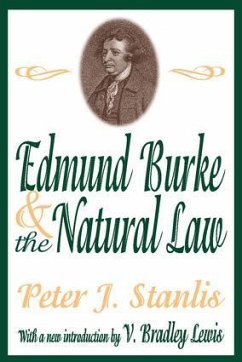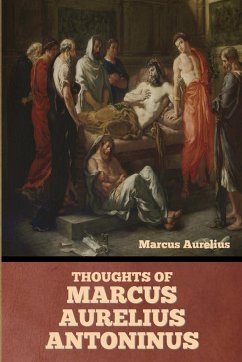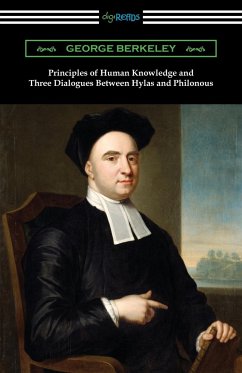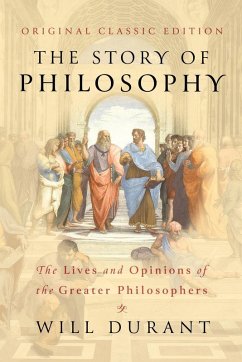
Classic Readings and Cases in the Philosophy of Law
Versandkostenfrei!
Versandfertig in 1-2 Wochen
192,99 €
inkl. MwSt.
Weitere Ausgaben:

PAYBACK Punkte
96 °P sammeln!
Classic Readings and Cases in the Philosophy of Lawpresents the philosophy of law as an on-going series of debates with overlapping lines and cross connections.
This debate is illustrated through a series of complete readings and cases (including dissenting opinions). The book aims to teach students how to think critically and philosophically about a range of issues in law, rather than trying to teach the law itself. It uses the law as a focus to bring into relief many social and political issues of pressing importance in contemporary society.
Product Description
With over sixty cases as support, Classic Readings and Cases in the Philosophy of Law presents the philosophy of law as a perpetual series of debates with overlapping lines and cross connections. Exploring the relation of law to morality, liberty, disobedience, and punishment, this book delves into many social and political issues of pressing importance in contemporary society. The extensive anthology of cases covers the mundane to the grandest of constitutional issues, including controversial topics like ownership of genetic material, capital punishment, and gay rights. With its brief introductions to readings and cases and extensive study questions, this book encourages readers to think critically and philosophically.
Features + Benefits
Adapted from a bestselling book for the Canadian market, Classic Readings and Cases in the Philosophy of Law is organized around five central topics giving an overview of the major questions as well as the range of possible answers. Themes are:
what is law
separation thesis, legal reasoning and indeterminacy
civil disobedience and the obligation to obey the law
law and liberty
punishment
Both classic and contemporary readings representing important approaches to various legal issues can be used to organize lectures, create exams, or as essay assignments.
Brief introductions open each reading, and extensive study questions follow them.
A large number of cases dealing with a wide range of topics covering the mundane to the grandest of constitutional issues, including areas of high interest in contemporary social and political philosophy (the rights of homosexuals, capital punishment, ownership of genetic material, etc.)
Cases present the legal reasoning of the justices involved (majority and dissenting) as well as the various theoretical positions presented.
Brief introductions to each case describe the central issue being litigated, the decision of the court, and why the case is important from a philosophical point of view.
A selection of constitutional amendments and selections (including parts of the Canadian Charter of Rights and Freedoms for contrast) has been included along with a glossary of terms and Latin phrases for easy reference.
Backcover
Classic Readings and Cases in the Philosophy of Law
Susan Dimock . Canada Pearson
With over sixty cases as support, this text presents the philosophy of law as a perpetual series of debates with overlapping lines and cross connections. Using law as a focus to bring into relief many social and political issues of pressing importance in contemporary society, this book encourages readers to think critically and philosophically.
Classic Readings and Cases in the Philosophy of Law centers on five major questions:
What is law?
What, if any, connection must there be between law and morality?
When should law be used to restrict the liberty of individuals?
To what extent should democratic states permit civil disobedience?
What, if anything, justifies the infliction of punishment on those who violate the law?
The extensive anthology of cases covers the mundane to the grandest of constitutional issues, including controversial topics like ownership of genetic material, capital punishment, and gay rights. Brief introductions to each case describe the central issue being litigated, the legal reasoning of the justices-both majority and dissenting-the decision of the court, and its philosophical significance.
Please visit us at www.ablongman.com
Contents
Preface
Introduction
PART 1: WHAT IS LAW?
Chapter 1: Traditional Natural Law Theory: Law for the Common Good
St. Thomas Aquinas, Law for the Common Good
Chapter 2: Legal Positivism I: Law as Command
John Austin, The Command Theory of Law
Chapter 3: American Legal Realism: Law as Judicial Pronouncement
Oliver Wendell Holmes, Law as Systematized Prediction of What the Courts Will Do
Jerome Frank, Law as the Product of Court Decisions
Chapter 4: Legal Positivism II: Law as the Union of Primary and Secondary Rules
H.L.A. Hart, Law as the Union of Primary and Secondary Rules
Chapter 5: Law and Economics: Law as Efficiency
Susan Dimock, Law and Economics
Chapter 6: Feminist Jurisprudence: Law as a Patriarchal Institution
Patricia Smith, Law as a Patriarchal Institution
Catharine A. MacKinnon, Law as Male Power
Additional Readings
Cases for Discussion
Palsgraf v. Long Island Rail Road Co.
Lynch v. Fisher
Hammontree v. Jenner
Stewart v. Dutra Construction Co.
Stockberger V. United States
McFall v. Shimp
Farwell v. Keaton
Berman v. Allan
Sindell v. Abbott Laboratories
Moore v. Regents of the University of California
Kowalski v. Tesmer
Penn Central Transportation Co. v. New York City
Kelo v. City of New London
PART 2: THE SEPARATION THESIS, LEGAL REASONING AND LEGAL INDETERMINACY: H.L.A. Hart and His Critics
Chapter 7: The Separation of Law and Morality
H.L.A. Hart, Positivism and the Separation of Law and Morals
Chapter 8: The Morality of Law
Lon L. Fuller, Positivism and Fidelity to Law-A Reply to Professor Hart
The Morality that Makes Law Possible
Chapter 9: Law as a System of Rights
Ronald Dworkin, Rules, Principles, and Rights
Hard Cases
Integrity in Law
Chapter 10: Hart's Response to Dworkin
H.L.A. Hart, Defending Legal Positivism
Chapter 11: Law as an Indeterminate Patchwork of Irreconcilable Ideologies
Andrew Altman, Legal Realism, Critical Legal Studies, and Dworkin
Critical Legal Studies and the Rule of Law
Additional Readings
Cases for Discussion
Riggs v. Palmer
State of Maryland v. Rusk
Raich v. Ashcroft
Small v. United States
Korematsu v. United States
Plessey v. Ferguson
Brown v. Board of Education
United States v. Virginia
Hopwood v. Texas
Grutter v. Bollinger
Michael M. v. Sonoma County
Personnel Administrator of Massachusetts v. Feeney
Afroyim v. Rusk
PART 3: CIVIL DISOBEDIENCE AND THE OBLIGATION TO OBEY LAW
Chapter 12: The Duty to Oppose Injustice
Martin Luther King, Jr., Letter from Birmingham Jail
Chapter 13: Civil Disobedience and Conscientious Refusal
John Rawls, Civil Disobedience and Conscientious Refusal
Chapter 14: The Benefit of Challenging Uncertain Laws
Ronald Dworkin, Civil Disobedience
Additional Readings
Cases for Discussion
Schenck v. United States
Whitney v. California
Walker v. City of Birmingham
Minersville School District, Board of Education v. Gobitis
Wisconsin v. Yoder
Employment Division, Dept. of Human Resources of Oregon v. Smith
United States v. Schoon
PART 4: LAW AND LIBERTY
Chapter 15: Civil Disobedience and the Presumption of an Obligation to Obey the Law
Chapter 16: In Defense of Liberty
John Stuart Mill, On Liberty
Chapter 17: Paternalism
Gerald Dworkin, Paternalism
Chapter 18: Legal Moralism
Lord Patrick Devlin, The Enforcement of Morals
Chapter 19: A Refutation of Legal Moralism
H.L.A. Hart, Law, Liberty, and Morality
Additional Readings
Cases for Discussion
John Doe v. University of Michigan
Texas v. Johnson
Chen v. California
New York Times v. Sullivan
New York Times Co. v. United States
Village of Skokie v. National Socialist Party of America
Hernandez v. Commonwealth of Virginia
Boy Scouts of America v. Dale
Miller v. California
Paris Adult Theater I v. Slaton
Reno v. American Civil Liberties Union
Engel v. Vitale
Edwards v. Aguillard
Van Orden v. Perry
Griswold v. Connecticut
Roe v. Wade
Planned Parenthood v. Casey
Bowers v. Hardwick
Lawrence v. Texas
Loving v. Virginia
Goodridge v. Department of Public Health
This debate is illustrated through a series of complete readings and cases (including dissenting opinions). The book aims to teach students how to think critically and philosophically about a range of issues in law, rather than trying to teach the law itself. It uses the law as a focus to bring into relief many social and political issues of pressing importance in contemporary society.
Product Description
With over sixty cases as support, Classic Readings and Cases in the Philosophy of Law presents the philosophy of law as a perpetual series of debates with overlapping lines and cross connections. Exploring the relation of law to morality, liberty, disobedience, and punishment, this book delves into many social and political issues of pressing importance in contemporary society. The extensive anthology of cases covers the mundane to the grandest of constitutional issues, including controversial topics like ownership of genetic material, capital punishment, and gay rights. With its brief introductions to readings and cases and extensive study questions, this book encourages readers to think critically and philosophically.
Features + Benefits
Adapted from a bestselling book for the Canadian market, Classic Readings and Cases in the Philosophy of Law is organized around five central topics giving an overview of the major questions as well as the range of possible answers. Themes are:
what is law
separation thesis, legal reasoning and indeterminacy
civil disobedience and the obligation to obey the law
law and liberty
punishment
Both classic and contemporary readings representing important approaches to various legal issues can be used to organize lectures, create exams, or as essay assignments.
Brief introductions open each reading, and extensive study questions follow them.
A large number of cases dealing with a wide range of topics covering the mundane to the grandest of constitutional issues, including areas of high interest in contemporary social and political philosophy (the rights of homosexuals, capital punishment, ownership of genetic material, etc.)
Cases present the legal reasoning of the justices involved (majority and dissenting) as well as the various theoretical positions presented.
Brief introductions to each case describe the central issue being litigated, the decision of the court, and why the case is important from a philosophical point of view.
A selection of constitutional amendments and selections (including parts of the Canadian Charter of Rights and Freedoms for contrast) has been included along with a glossary of terms and Latin phrases for easy reference.
Backcover
Classic Readings and Cases in the Philosophy of Law
Susan Dimock . Canada Pearson
With over sixty cases as support, this text presents the philosophy of law as a perpetual series of debates with overlapping lines and cross connections. Using law as a focus to bring into relief many social and political issues of pressing importance in contemporary society, this book encourages readers to think critically and philosophically.
Classic Readings and Cases in the Philosophy of Law centers on five major questions:
What is law?
What, if any, connection must there be between law and morality?
When should law be used to restrict the liberty of individuals?
To what extent should democratic states permit civil disobedience?
What, if anything, justifies the infliction of punishment on those who violate the law?
The extensive anthology of cases covers the mundane to the grandest of constitutional issues, including controversial topics like ownership of genetic material, capital punishment, and gay rights. Brief introductions to each case describe the central issue being litigated, the legal reasoning of the justices-both majority and dissenting-the decision of the court, and its philosophical significance.
Please visit us at www.ablongman.com
Contents
Preface
Introduction
PART 1: WHAT IS LAW?
Chapter 1: Traditional Natural Law Theory: Law for the Common Good
St. Thomas Aquinas, Law for the Common Good
Chapter 2: Legal Positivism I: Law as Command
John Austin, The Command Theory of Law
Chapter 3: American Legal Realism: Law as Judicial Pronouncement
Oliver Wendell Holmes, Law as Systematized Prediction of What the Courts Will Do
Jerome Frank, Law as the Product of Court Decisions
Chapter 4: Legal Positivism II: Law as the Union of Primary and Secondary Rules
H.L.A. Hart, Law as the Union of Primary and Secondary Rules
Chapter 5: Law and Economics: Law as Efficiency
Susan Dimock, Law and Economics
Chapter 6: Feminist Jurisprudence: Law as a Patriarchal Institution
Patricia Smith, Law as a Patriarchal Institution
Catharine A. MacKinnon, Law as Male Power
Additional Readings
Cases for Discussion
Palsgraf v. Long Island Rail Road Co.
Lynch v. Fisher
Hammontree v. Jenner
Stewart v. Dutra Construction Co.
Stockberger V. United States
McFall v. Shimp
Farwell v. Keaton
Berman v. Allan
Sindell v. Abbott Laboratories
Moore v. Regents of the University of California
Kowalski v. Tesmer
Penn Central Transportation Co. v. New York City
Kelo v. City of New London
PART 2: THE SEPARATION THESIS, LEGAL REASONING AND LEGAL INDETERMINACY: H.L.A. Hart and His Critics
Chapter 7: The Separation of Law and Morality
H.L.A. Hart, Positivism and the Separation of Law and Morals
Chapter 8: The Morality of Law
Lon L. Fuller, Positivism and Fidelity to Law-A Reply to Professor Hart
The Morality that Makes Law Possible
Chapter 9: Law as a System of Rights
Ronald Dworkin, Rules, Principles, and Rights
Hard Cases
Integrity in Law
Chapter 10: Hart's Response to Dworkin
H.L.A. Hart, Defending Legal Positivism
Chapter 11: Law as an Indeterminate Patchwork of Irreconcilable Ideologies
Andrew Altman, Legal Realism, Critical Legal Studies, and Dworkin
Critical Legal Studies and the Rule of Law
Additional Readings
Cases for Discussion
Riggs v. Palmer
State of Maryland v. Rusk
Raich v. Ashcroft
Small v. United States
Korematsu v. United States
Plessey v. Ferguson
Brown v. Board of Education
United States v. Virginia
Hopwood v. Texas
Grutter v. Bollinger
Michael M. v. Sonoma County
Personnel Administrator of Massachusetts v. Feeney
Afroyim v. Rusk
PART 3: CIVIL DISOBEDIENCE AND THE OBLIGATION TO OBEY LAW
Chapter 12: The Duty to Oppose Injustice
Martin Luther King, Jr., Letter from Birmingham Jail
Chapter 13: Civil Disobedience and Conscientious Refusal
John Rawls, Civil Disobedience and Conscientious Refusal
Chapter 14: The Benefit of Challenging Uncertain Laws
Ronald Dworkin, Civil Disobedience
Additional Readings
Cases for Discussion
Schenck v. United States
Whitney v. California
Walker v. City of Birmingham
Minersville School District, Board of Education v. Gobitis
Wisconsin v. Yoder
Employment Division, Dept. of Human Resources of Oregon v. Smith
United States v. Schoon
PART 4: LAW AND LIBERTY
Chapter 15: Civil Disobedience and the Presumption of an Obligation to Obey the Law
Chapter 16: In Defense of Liberty
John Stuart Mill, On Liberty
Chapter 17: Paternalism
Gerald Dworkin, Paternalism
Chapter 18: Legal Moralism
Lord Patrick Devlin, The Enforcement of Morals
Chapter 19: A Refutation of Legal Moralism
H.L.A. Hart, Law, Liberty, and Morality
Additional Readings
Cases for Discussion
John Doe v. University of Michigan
Texas v. Johnson
Chen v. California
New York Times v. Sullivan
New York Times Co. v. United States
Village of Skokie v. National Socialist Party of America
Hernandez v. Commonwealth of Virginia
Boy Scouts of America v. Dale
Miller v. California
Paris Adult Theater I v. Slaton
Reno v. American Civil Liberties Union
Engel v. Vitale
Edwards v. Aguillard
Van Orden v. Perry
Griswold v. Connecticut
Roe v. Wade
Planned Parenthood v. Casey
Bowers v. Hardwick
Lawrence v. Texas
Loving v. Virginia
Goodridge v. Department of Public Health
With over sixty cases as support, this text presents the philosophy of law as a perpetual series of debates with overlapping lines and cross connections. Using law as a focus to bring into relief many social and political issues of pressing importance in contemporary society, this book encourages readers to think critically and philosophically. Classic Readings and Cases in the Philosophy of Law centers on five major questions: What is law? What, if any, connection must there be between law and morality? When should law be used to restrict the liberty of individuals? To what extent should democratic states permit civil disobedience? What, if anything, justifies the infliction of punishment on those who violate the law? The extensive anthology of cases covers the mundane to the grandest of constitutional issues, including controversial topics like ownership of genetic material, capital punishment, and gay rights. Brief introductions to each case describe the central issue being litigated, the legal reasoning of the justices-both majority and dissenting-the decision of the court, and its philosophical significance.






